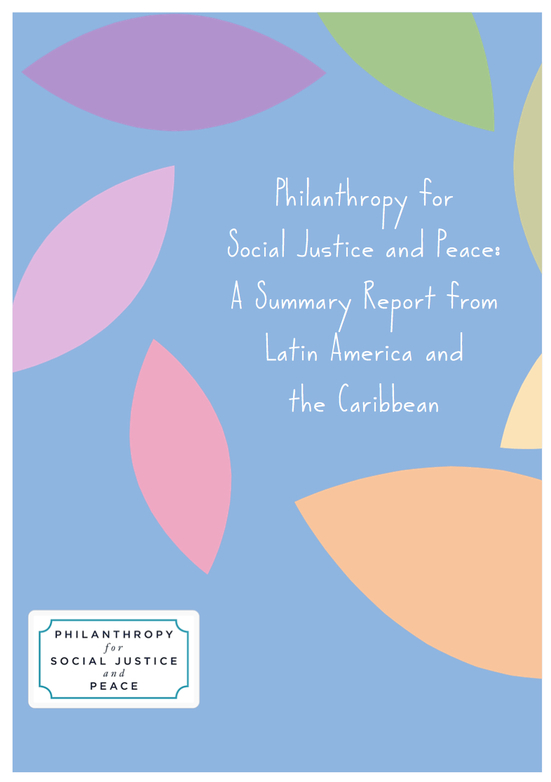 US peacebuilding theorist John Paul Lederach talks about achieving “critical yeast” in difficult circumstances, with this arguably being of greater importance than “critical mass.” If the recently circulated report on philanthropy for social justice and peace in Latin America and the Caribbean is to be believed that is exactly what exists: critical yeast. The 32 foundations located and working in the region that participated in this study are mainly public or community foundations. They display a depth of experience that ranges from a focus on women to an expertise in human rights and social activism. A shared concern is shown about the extent of inequalities, lamented by one participant as the “big gap between the haves and have nots”, across the continent. These are foundations that are themselves activist, participative and mission-driven in nature.
US peacebuilding theorist John Paul Lederach talks about achieving “critical yeast” in difficult circumstances, with this arguably being of greater importance than “critical mass.” If the recently circulated report on philanthropy for social justice and peace in Latin America and the Caribbean is to be believed that is exactly what exists: critical yeast. The 32 foundations located and working in the region that participated in this study are mainly public or community foundations. They display a depth of experience that ranges from a focus on women to an expertise in human rights and social activism. A shared concern is shown about the extent of inequalities, lamented by one participant as the “big gap between the haves and have nots”, across the continent. These are foundations that are themselves activist, participative and mission-driven in nature.
The Mobilization of Assets
The importance of mobilizing assets and resources for both grantmaking and organizational sustainability in order to achieve a critical mass of philanthropy is clearly recognized as essential. For most, however, talk of foundation endowments might be the ideal but is often seen as a utopian step too far. The pervasive influence of giving for charitable purposes through the Catholic Church continues to frame the general public understanding of philanthropy. The vogue for corporate social responsibility (CSR) has paralleled this more traditional giving through a proliferation of corporate foundations that promote “private social investment.” Neither of these philanthropic models are felt to address entrenched systemic and structural issues, although the work of community foundations in Mexico and Brazil to influence private sector and individual donors is noted. This work is described as being particularly important given the marked decline in both philanthropic and development aid resources from the Global North.
Efforts to design effective fund development strategies in order to mobilise resources that can support aspects of civil society that promote progressive social change in the region has resulted in some collaborative platforms and alliances. One such is Conmujeres, which involves the Women’s Funds working in Brazil, Chile, Nicaragua, Colombia, Argentina and Bolivia. However the challenge of fund development is still formidable.
“Part of a Process”
What is striking about many of the quotes from locally-based funders contained in the report is a certain sense of humility. There are no grandiose claims about being at the “cutting edge” of development (although many of the survey respondents are) or to assert strategic impact. Instead the emphasis is placed on collective impact between funders and their grantees, with the latter encouraged to be co-designers and protagonists of their own change. Working to ensure that individuals and groups have the power to have a say on issues that affect them is central to what funders for social justice are all about. This was explained by a women’s fund respondent: “We respect the decision of women and their organizations and empower them to define their priorities and use their resources accordingly.” This entails listening and responding to people rather than making them jump through hoops (however strategically crafted) by the foundations themselves. Another foundation offered the view: “Our partners are a reflection of us: if there is a weakness in their political or external persona that affects us.” For this reason an emphasis is placed on building mutual trust and good communication between funders and their grantees, as well as encouraging peer learning amongst the grantees themselves.
Translating relationship building into effective organizational alliances is reported as being a harder ask. It often requires “paso a paso” (step by step), that can be particularly fraught when the local foundations themselves are struggling to achieve even medium-term sustainability.
“There is a Tremendous Need for Help”
The report, which was issued by the Working Group on Philanthropy for Social Justice and Peace, concludes with the warning that the relative scale of the community philanthropy institutions involved appears miniscule when measured against the issues that they are seeking to address. There is the challenge of fund development but also the uneven spread of mission-driven funders across the region. Faced with the problem of diminishing external funding and a local philanthropic culture that tends to shy away from addressing social justice issues, foundations that are committed to social justice and peace have a major task in shifting the accustomed approaches. It is accepted by the study participants that there is an urgent need to hone their messages. As one foundation staff member argued: “Much of the time we are assessing what we do, but not necessarily communicating it, or creating narratives that would convey what we do.” This is an honest critique that may apply to other areas of the globe in addition to Latin American and the Caribbean. It is clear, however, that when the appropriate narrative is crafted – and work on this is ongoing – it will continue to assert the importance of activism and social participation. Community-based philanthropy for social justice and peace in Latin America and the Caribbean may well have its weaknesses, but equally it has the benefit of impressive programmatic experience and commitment that can usefully be shared with others.